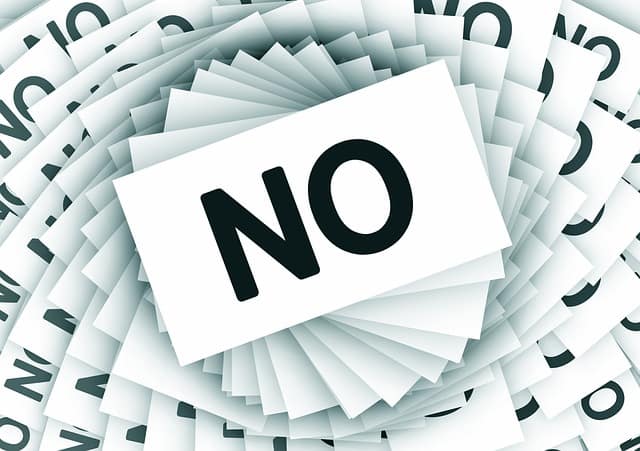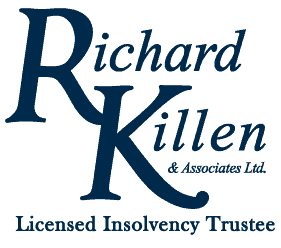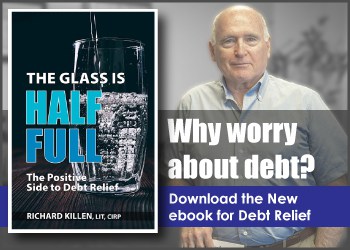Consumer Proposal Rejection?
Posted on: December 3, 2014Posted in Bankruptcy, Consumer Proposals, Finances | Comments Off on Consumer Proposal Rejection?
 So the consumer proposal that you’ve filed in Ontario will soon be presented to your creditors. You’ve worked with a Licensed Insolvency Trustee, such as Richard Killen & Associates, to come up with a reasonable payment plan for your debts They helped you fill out the necessary forms and filed them for you with the Official Receiver.
So the consumer proposal that you’ve filed in Ontario will soon be presented to your creditors. You’ve worked with a Licensed Insolvency Trustee, such as Richard Killen & Associates, to come up with a reasonable payment plan for your debts They helped you fill out the necessary forms and filed them for you with the Official Receiver.
Protections are in place
As soon as the consumer proposal is filed a legal protection goes into place – automatically. This means that none of your creditors can start, or continue, any collection effort against either you, or your property. In other words, all your creditors must direct their attention to your proposal, through the trustee. (In a consumer proposal the trustee’s title becomes “administrator.”)
Like most things in the law, there is an exception to this general principle. In this case a secured creditor, like a mortgage holder, can enforce his security rights under his contract with you. So if you wanted to keep your house or car, you would have to keep up your payments, or the creditor would have the right to repossess it from you. So that creditor can’t be included in your proposal.
But, as far as regular, unsecured creditors, you don’t make any more payments towards those debts because they will get paid through your consumer proposal. There is no point in their continuing to write to you, call you, demand payments from you, put the account in collection, garnishee your wages and so on, because the proposal has taken over your obligations to them.
So you’ve filed. What happens next?
Once the proposal is filed, the administrator must tell your creditors about it. A copy is sent to all of them and they are invited to file a claim to let you know, within 45 days, whether they are in favour of your offer or not. If they are, which is what normally happens, then you’ve got a deal. If not, we will have to have a meeting with the creditors, where everything can be discussed and eventually voted on.
To be approved at a vote, all it takes is a simple majority. The creditors get one vote for every dollar you owe them. That means the larger creditors are more important than the little ones. To be accepted your proposal must get 50% plus one vote.
Wondering what your chances are that the creditors will accept the proposal?
Your chances are good
While we cannot guarantee that any proposal offer will be successful, the vast majority of these legally binding settlements that we negotiate are accepted. The trustees at Richard Killen & Associates take a lot of time and effort to understand your situation – including what level of payments you can afford – and have a lot of experience in dealing with creditors. We generally know what they are likely to accept. In short, we listen to them and we listen to you, and then help you craft a compromise that both you and your creditors can live with.
Why not handle it yourself?
The big advantages of doing a consumer proposal instead of handling negotiations with creditors yourself are:
- The filing of the proposal takes away the creditors’ other options; they must come to the table.
- You don’t have to get everybody to agree. The majority rules.
- A proposal works with all your creditors collectively.
- You don’t have to pay 100% of the debt. You can reach a compromise amount.
If the creditors representing the majority of the dollar value of your debt vote to accept the proposal, then it will become legally binding on all the creditors (and you).
Initial rejection is not the end
Though it is not a great sign, a rejection of your proposal, along with a subsequent meeting, is just part of the process. It usually means the creditors want you to offer more money, but this amount is still under negotiation. You still have the opportunity to make a deal. The trustee will continue to work with both sides to come up with an acceptable compromise. Often by adding a few dollars to the monthly payments, or by extending the payment period by a few months, the creditors will be satisfied.
So, is a proposal better than bankruptcy?
That is a good question. We get asked it a lot.
Very few people want to go bankrupt. They do so because they have to. Doing a proposal avoids bankruptcy, but whether it is the right move depends on individual circumstances. Only you can really answer that question.
For the creditors, it usually boils down to how much money they will receive. Creditors are keenly aware that what’s been offered them is better than what they’d receive in a bankruptcy. They know that if they come back and ask for too much more money that they may make you believe that a bankruptcy is the better way to go. They don’t want that either.
Whether a proposal or a bankruptcy is the right way for you, is something you need to discuss with the trustee. That’s what we at Richard Killen & Associates are here for. Call us.
And again, don’t worry too much. At the end of the day, most reasonable consumer proposals in Ontario are accepted.










